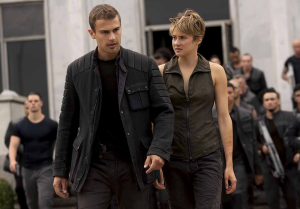
“Insurgent” mimics similar dystopian-themed films, lacking originality but boasting impressive actors.
★★★☆☆
Lately, the literary and cinematic markets have become saturated by formulaic young adult fiction that seems to recycle the same core elements. Since its film release last March, “Divergent” has battled its pervasive image as a lesser “Hunger Games” imitator, and this struggle to break loose from its pigeonholed status among trite teenage dystopian science fiction is far from over.
“Insurgent,” the second installation in the series, continues to fight for its own place in this inundated market. While it does have redeeming thematic and cinematic moments, overall the film falls prey to the same pitfalls that have continually plagued genre fiction as well as normal Hollywood blockbusters.
The story picks up where “Divergent” left off; after stopping Jeanine’s (Kate Winslet) brainwashed Dauntless army, Tris (Shailene Woodley) and Four (Theo James) take refuge with the Amity faction.
Meanwhile, Jeanine attempts to unlock a message left by the founders of the city, and she needs a powerful divergent to do it. This begins a brutal search for all divergents, which once again pushes Tris and Four back into the battle. This time, they enlist both the resisting Dauntless and the factionless in their fight against Jeanine’s regime.
The script does little to build upon Veronica Roth’s already weak and predictable plot. One-dimensional foil characters plague the movie with their uninteresting simplicity: Jeanine is the unrepentant villain, Eric (Jai Courtney) the heartless henchman and Four the strong, yet sensitive, love interest. The themes of selflessness and triumphing against evil are frustratingly transparent, leaving little to the imagination and causing eyes to roll at every hackneyed expression.
To make matters worse, the new director, Robert Schwentke, embeds into “Insurgent” the typical action-reliant plot and world-building holes that further aggravate audiences. In multiple instances, Tris and Four come under fire from enemy Dauntless forces. In one scene, Tris and Four stand in an open field while the Dauntless henchmen shoot bullet after bullet at them from their forest cover. Unsurprisingly, not one of the dozens of shots fired grazes their intended targets. These scenarios are watered down to the point of implausibility, prioritizing fanciful props over true substance.
Added to this incredulity is a lack of chemistry between Woodley and James that rivals the strained attraction between Dakota Johnson and Jamie Dornan in “50 Shades of Grey.” James as Four fulfils his role as the characteristic heroic hunk, complete with smoldering eyes and sculpted abs. However, his outward appeal is crippled by his interactions with Woodley, which reveal a level of stiff, forced intimacy that is ultimately unconvincing.
Beyond these major setbacks, there are aspects of the film that push the bounds of the stereotypical mold. Although Tris is conflicted by the fact that she killed her friend Will, neither she nor Four hesitates in the face of violence and death. Some would say that this copies Katniss’ own issues in “The Hunger Games,” where she is forced to kill for her own survival, but multiple situations develop in “Insurgent” that dive further than its peer into the waters of moral ambiguity.
At one point, Four captures a key Dauntless member of the Erudite alliance (no spoilers). Cue the villain’s sardonic monologue, where Four is then presented with the option of exacting justice (some would say revenge) or granting mercy. In the end, Four kills the man at point-blank range. Scene after scene of these unflinching confrontations with death shock the audience, reminding them that their protagonists are not morally infallible.
Aside from her on-screen romance with James, Shailene Woodley provides the most impressive acting. Drawing from the dual debate over the morality of both her character’s actions and of her entire society, Woodley runs the gamut of emotional expressions and delivers a praiseworthy performance. Her moments of rage and passion are counterbalanced by scenes of poignant self-doubt and sorrow that harken back to her heart wrenching display as Hazel, the cancer-stricken protagonist in “The Fault in Our Stars.”
Perhaps the most experimental aspect of “Insurgent” is Schwentke’s use of CGI, which, while not exactly the most noteworthy aspect of the movie, still adds a stimulating punch. During the film, Tris becomes subject to a series of simulated tests. They play out like a fused version of “The Matrix” and “Inception,” jammed with death-defying, cinderblock-chipping fights, crumbling cityscapes, freefalls with cratered landings and small rips in the simulated fabric that remind the protagonist that none of it is truly real.
“Insurgent” is weighed down by its roots as just one of many young adult dystopian fiction franchises. When compared to its contemporaries, it does not seem to add anything wholly original to the genre, but taken separately, it does provide a pleasant watch. Woodley keeps the cliched plot afloat with her thought-provoking performance, and hopefully the film has set up enough compelling backstory for the final installation to at last propel the trilogy out of its own mediocrity.



















